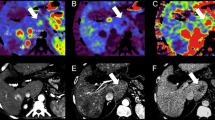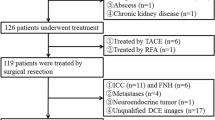Abstract
Objective
To determine the value of perfusion computed tomography (CT-p) in the quantitative assessment of tumour-related neoangiogenesis processes in patients with hepatocellular carcinoma (HCC).
Materials and methods
Fifty-two biopsy proven HCC lesions were examined with dynamic CT investigations during injection of 50 mL of contrast agent (350 mgI/mL). A dedicated perfusion software which generated a quantitative map of arterial and portal perfusion by means of a colour scale was employed. The following parameters related to the blood microcirculation and tissue perfusion were calculated: hepatic perfusion (Perf), tissue blood volume (BV), hepatic perfusion index (HPI), arterial perfusion (AP), portal perfusion (PP), and time to peak (TTP). Perfusion parameters were statistically analysed, comparing neoplastic lesions with cirrhotic parenchyma.
Results
Perf, BV, HPI and AP values were higher (P < 0.001), whereas PP and TTP were lower (P < 0.001) in HCC relative to the surrounding liver. No significant correlation was found between perfusion parameters and HCC grade. Values of perfusion parameters in the cirrhotic liver of patients with and without HCC were not significantly different.
Conclusions
Our results suggest that CT-p can help in non-invasive quantification of tumour blood supply, related to the formation of new arterial structures (neoangiogenesis), which are essential for tumour growth.
Key Points
• Perfusion computed tomography (CT) enables depiction of tumour vascular physiology
• Perfusion CT is non-invasive and is now quick to perform and analyse
• Quantitative measurements of hepatic perfusion provide important information about hepatocellular carcinoma (HCC)
• Such perfusion CT data may help in the determination of the outcome of HCC.
• Perfusion CT can act as an in-vivo biomarker of tumour-related angiogenesis.




Similar content being viewed by others
References
Parkin DM, Bray F, Ferlay J, Pisani P (2001) Estimating the world cancer burden: Globocan 2000. Int J Cancer 94:153–156
Barbara L, Benzi G, Gaiani S, Fusconi F, Zironi G, Siringo S, Rigamonti A, Barbara C, Grigioni W, Mazziotti A et al (1992) Natural history of small untreated hepatocellular carcinoma in cirrhosis: a multivariate analysis of prognostic factors of tumor growth rate and patient survival. Hepatology 16(1):132–137
Mazzaferro V, Regalia E, Doci R, Andreola S, Pulvirenti A, Bozzetti F, Montalto F, Ammatuna M, Morabito A, Gennari L (1996) Liver transplantation for the treatment of small hepatocellular carcinomas in patients with cirrhosis. N Engl J Med 334(11):693–699
Pandharipande PV, Krinsky GA, Rusinek H, Lee VS (2005) Perfusion imaging of the liver: current challenges and future goals. Radiology. doi:10.1148/radiol.2343031362
Kan Z, Phongkitkarun S, Kobayashi S et al (2005) Functional CT for quantifying tumor perfusion in antiangiogenic therapy in a rat model. Radiology 234(3):661–673
Park YN, Yang CP, Fernandez GJ, Cubukcu O, Thung SN, Theise ND (1998) Neoangiogenesis and sinusoidal “capillarization” in dysplastic nodules of the liver. Am J Surg Pathol 22(6):656–662
Krinsky GA, Theise ND, Rofsky NM, Mizrachi H, Tepperman LW, Weinreb JC (1998) Dysplastic nodules in cirrhotic liver: arterial phase enhancement at CT and MR imaging—a case report. Radiology 209:461–464
Krinsky GA, Zivin SB, Thorner KM, Lee VS, Theise ND, Weinreb JC (2002) Low-grade siderotic dysplastic nodules: determination of premalignant lesions on the basis of vasculature phenotype. Acad Radiol 9(3):336–341
Wanless IR (1996) Nodular regenerative hyperplasia, dysplasia, and hepatocellular carcinoma. Am J Gastroenterol 91:836–837
Park YN, Kim YB, Yang KM, Park C (2000) Increased expression of vascular endothelial growth factor and angiogenesis in the early stage of multistep hepatocarcinogenesis. Arch Pathol Lab Med 124:1061–1065
Kim CK, Lim JH, Park CK, Choi D, Lim HK, Lee WJ (2005) Neoangiogenesis and sinusoidal capillarization in hepatocellular carcinoma: correlation between dynamic CT and density of tumor microvessels. Radiology 237(2):5c–34
Cuenod CA, Fournier L, Balvay D, Guinebretière JM (2006) Tumor angiogenesis: pathophysiology and implications for contrast-enhanced MRI and CT assessment. Abdom Imaging 31(2):188–193. Review
Hayashi M, Matsui O, Ueda K, Kawamori Y, Kadoya M, Yoshikawa J, Gabata T, Takashima T, Nonomura A, Nakanuma Y (1999) Correlation between the blood supply and grade of malignancy of hepatocellular nodules associated with liver cirrhosis: evaluation by CT during intraarterial injection of contrast medium. Am J Roentgenol 172:969–976
Ueda K, Matsui O, Kawamori Y, Nakanuma Y, Kadoya M, Yoshikawa J, Gabata T, Nonomura A, Takashima T (1998) Hypervascular hepatocellular carcinoma: evaluation of hemodynamics with dynamic CT during hepatic arteriography. Radiology 206:161–166
Tsushima Y, Funabasama S, Aoki J, Sanada S, Endo K (2004) Quantitative perfusion map of malignant liver tumors, created from dynamic computed tomography data. Acad Radiol 11(2):215–223
Miles KA (2003) Perfusion CT for the assessment of tumour vascularity: which protocol? Br J Radiol. doi:10.1259/bjr/18486642
Miles KA, Griffiths MR (2003) Perfusion CT: a worthwhile enhancement? Br J Radiol 76(904):220–231. Review
Lee TY, Purdie TG, Stewart E (2003) CT imaging of angiogenesis. Q J Nucl Med 47:171–187
Bruix J, Sherman M (2005) Management of hepatocellular carcinoma. Hepatology 42(5):1208–1236
Yang HF, Du Y, Ni JX, Zhou XP, Li JD, Zhang Q, Xu XX, Li Y (2010) Perfusion computed tomography evaluation of angiogenesis in liver cancer. Eur Radiol 20(6):1424–1430. doi:10.1007/s00330-009-1693-y
Padhani AR (1999) Dynamic contrast-enhanced MRI studies in human tumours. Br J Radiol 72:427–431
Miles KA, Leggett DA, Kelley BB, Hayball MP, Sinnatamby R, Bunce I (1998) In vivo assessment of neovascularization of liver metastases using perfusion CT. Br J Radiol 71:276–281
Goh V, Padhani AR (2006) Imaging tumor angiogenesis: functional assessment using MDCT or MRI? Abdom Imaging 31(2):194–199
Chen Y, Zhang J, Dai J, Feng X, Lu H, Zhou C (2010) Angiogenesis of renal cell carcinoma: perfusion CT findings. Abdom Imaging 35(5):622–628. doi:10.1007/s00261-009-9565-0
Yao J, Yang ZG, Chen TW, Li Y, Yang L (2011) Perfusion changes in gastric adenocarcinoma: evaluation with 64-section MDCT. Abdom Imaging 36(1):22–23
Sahani DV, Holalkere NS, Mueller PR, Zhu AX (2007) Advanced hepatocellular carcinoma: CT perfusion of liver and tumor tissue—initial experience. Radiology 243(3):736–743
D’Assignies G, Couvelard A, Bahrami S, Vullierme MP, Hammel P, Hentic O, Sauvanet A, Bedossa P, Ruszniewski P, Vilgrain V (2009) Pancreatic endocrine tumors: tumor blood flow assessed with perfusion CT reflects angiogenesis and correlates with prognostic factors. Radiology 250(2):407–716
Li Y, Yang ZG, Chen TW, Chen HJ, Sun JY, Lu YR (2008) Peripheral lung carcinoma: correlation of angiogenesis and first-pass perfusion parameters of 64-detector row CT. Lung Cancer 61(1):44–53
Ippolito D, Bonaffini PA, Ratti L, Antolini L, Corso R, Fazio F, Sironi S (2010) Hepatocellular carcinoma treated with transarterial chemoembolization: dynamic perfusion-CT in the assessment of residual tumor. World J Gastroenterol 16(47):5993–6000
Choi SH, Chung JW, Kim HC, Baek JH, Park CM, Jun S, Kim MU, Lee ES, Cho HR, Jae HJ, Lee W, Park JH (2010) The role of perfusion CT as a follow-up modality after transcatheter arterial chemoembolization: an experimental study in a rabbit model. Invest Radiol 45(7):427–436. Erratum in: Invest Radiol. 2010 Nov;45(11):754
Chen G, Ma DQ, He W, Zhang BF, Zhao LQ (2008) Computed tomography perfusion in evaluating the therapeutic effect of transarterial chemoembolization for hepatocellular carcinoma. World J Gastroenterol 14(37):5738–5743
Kan Z, Kobayashi S, Phongkitkarun S, Charnsangavej C (2005) Functional CT quantification of tumor perfusion after transhepatic arterial embolization in a rat model. Radiology 237:144–150
Meijerink MR, van Waesberghe JH, van der Weide L, van den Tol P, Meijer S, Comans EF, Golding RP, van Kuijk C (2009) Early detection of local RFA site recurrence using total liver volume perfusion CT initial experience. Acad Radiol 16:1215–1222
Okada M, Kim T, Murakami T (2011) Hepatocellular nodules in liver cirrhosis: state of the art CT evaluation (perfusion CT/volume helical shuttle scan/dual-energy CT, etc.). Abdom Imaging. doi:10.1007/s00261-011-9684-2
Author information
Authors and Affiliations
Corresponding author
Rights and permissions
About this article
Cite this article
Ippolito, D., Capraro, C., Casiraghi, A. et al. Quantitative assessment of tumour associated neovascularisation in patients with liver cirrhosis and hepatocellular carcinoma: role of dynamic-CT perfusion imaging. Eur Radiol 22, 803–811 (2012). https://doi.org/10.1007/s00330-011-2307-z
Received:
Revised:
Accepted:
Published:
Issue Date:
DOI: https://doi.org/10.1007/s00330-011-2307-z




